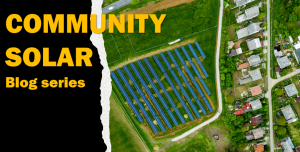Community Solar – Is it a scam? What are the traps?
By David Comis, Senior Energy Program Manager
This is part three of a 7 part series on community solar.
Please note, the comments in this blog are the personal opinions of the author and do not represent the views of the Maryland Energy Administration or the State of Maryland.
The Community Solar Pilot Program is a program specifically authorized by Maryland law. The Maryland Public Service Commission (PSC) is the program manager and authorizes which organizations can participate in the pilot program. In many cases, the subscriber organization (a subscriber organization is a person who owns or operates a renewable energy facility) is required to post a cash bond to develop certain projects. This bond can be used by the PSC to fine the subscriber organization for unethical behavior.
Authorized community solar subscriber organizations are required to include their PSC provided subscriber organization number on all advertising materials. If the person trying to sell you a subscription cannot tell you which project is being solicited, the kWh-ac/kW-dc ratio for the project, and the subscription number for the subscription organization, you should walk away.
Do not subscribe until you are able to read the whole agreement. If the company will not let you read the agreement before you sign, you should walk away. Read the whole agreement, and ask questions if there are things that you do not understand.
Be certain that you understand the agreement term, the provisions for ending the agreement early, the rate structure, and the unit of power or energy being subscribed. All of this and more is required to be provided to you on a summary sheet at the time you sign up to subscribe for community solar power, or energy.
Bottom line: Community Solar is not a scam, but like any other consumer product, it is up to the consumer to read the contract, ask questions, and determine if you want to have a business relationship with the business.


 1-888-373-7888
1-888-373-7888 233733
233733